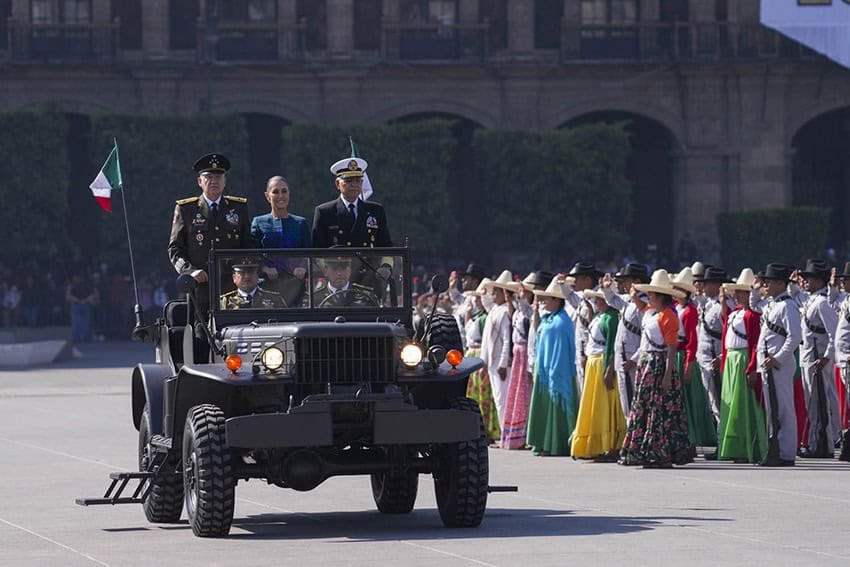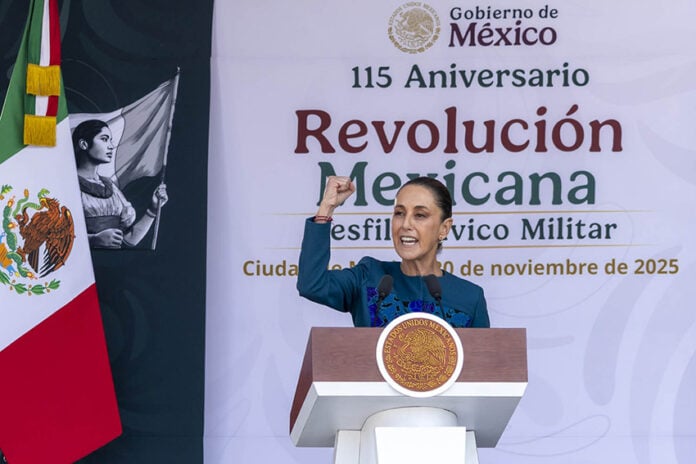President Claudia Sheinbaum used part of her Revolution Day address on Thursday to send a series of pointed messages to government opponents and critics, less than a week after large protests against her administration took place.
Speaking in Mexico City’s central square, the Zócalo, ahead of the civic-military parade to commemorate the 115th anniversary of the beginning of the Mexican Revolution, Sheinbaum took aim at “discourse that normalizes violence” as the “path” forward.

“Those who call for violence are mistaken,” she said five days after a group of so-called “black bloc” protesters attacked police in the Zócalo at the end of a “Generation Z” march against her administration that attracted more older adults than younger Mexicans.
“Those who encourage hate are mistaken. Those who believe force can replace justice are mistaken,” continued Sheinbaum, whose government accused foreign right-wing individuals and organizations, as well as Mexican opposition figures, of promoting the protests that took place last Saturday in Mexico City and dozens of other cities across the country.
The president also asserted that various other people are “mistaken,” including those who call for a “foreign intervention” to combat organized crime, those who think “women are weak” and those who believe that the “fourth transformation” political movement she leads is asleep at the wheel.
In addition, those who think that “campaigns of slander and lies” will resonate among the Mexican people and those who think “the people are stupid” are also wrong, Sheinbaum said.
The government has faced criticism from opposition parties, the participants in last Saturday’s protests and others over its anti-crime efforts, even though arrests are up and homicides are down, according to official statistics. It has also faced claims of complicity with organized crime and assertions that it is a “narco-government,” even though it has arrested large numbers of alleged crime group members, seized large quantities of narcotics, dismantled a significant number of clandestine drug labs and sent 55 organized crime figures to the U.S.
A major catalyst for last Saturday’s protests was the Nov. 1 assassination of Uruapan mayor Carlos Manzo, an outspoken anti-crime crusader who had urged the federal government to take a more active and aggressive approach to combating Mexico’s notorious criminal organizations. On Wednesday, federal Security Minister Omar García Harfuch announced the arrest of an alleged mastermind of the attack on the mayor.
‘There is a government that listens, respects and responds to its people’
In the first part of her speech, Sheinbaum recalled the armed uprising against “the dictator Porfirio Diáz” in the early 20th century, and said that the Mexican Revolution was “enshrined in the 1917 Constitution, the most advanced in the world in terms of social justice.”
The same constitution remains in effect today, although it has been significantly modified.
Sheinbaum dedicated another part of her address to praising her own government.
The president said that “four transformations have marked the history of Mexico” — independence from Spain, 19th century liberal reforms known collectively as “La Reforma,” the Mexican Revolution and the “fourth transformation” that she and others say began when former president Andrés Manuel López Obrador took office in late 2018.

“The transformation that began in 2018 is strong because there is honesty, results and love for the people,” Sheinbaum said.
“… Mexico is living a moment that previously seemed impossible. Today power is not used to subjugate, but to serve,” she said.
“There are no longer impositions or privileges; there is constitution, there is democracy and there is a government that listens, respects and responds to its people,” Sheinbaum said.
She also asserted that “today freedoms are not only granted from above,” but “exercised from below, from every neighborhood, from every community.”
“… No one is silenced in Mexico anymore, no one is persecuted for thinking differently and that is an achievement of the people of Mexico,” Sheinbaum claimed.
“Today, government is no longer a space for the few. It’s no longer a club for the privileged. Today it represents everyone — those who study, those who work, the shopkeepers, the young people, the Indigenous people and women, but above all it represents those who have the least, the modest people,” she said.
A much smaller ‘Gen Z’ protest took place in CDMX on Thursday
Less than an hour after Sheinbaum spoke in the Zócalo, a group of protesters embarked on the second “Generation Z” march in six days in Mexico City. While some 17,000 people took part in Saturday’s march from the Angel of Independence monument to the Zócalo, the turnout on Thursday was much lower, with around 200 participants of various ages, according to media reports.
Police officers temporarily stopped the contingent of protesters from entering the historic center of Mexico City to avoid any interruption to the military parade that was taking place, and to prevent any possibility of a confrontation between demonstrators and military personnel. The protesters eventually made it into the downtown area, but police prevented them from entering the Zócalo, where military parade infrastructure, including stands and screens, was being taken down.

The march was largely peaceful, although the Milenio newspaper reported that some “presumed protesters” attacked police officers at the intersection of Paseo de la Reforma, the capital’s most famous boulevard, and Juárez Avenue. Scuffles between the alleged protesters and police were filmed and posted to social media.
As was the case on Saturday, some protesters carried the Straw Hat Pirates’ Jolly Roger, a flag that features in the Japanese manga series “One Piece” and which has become closely associated with “Gen Z” protest movements around the world. Others carried Mexican flags and flags that called for “justice for Carlos Manzo.”
The El Universal newspaper reported that the protesters demanded that the federal government establish “a Mexico without narcos.”
One protester, 29-year-old Neptalí Roa, told the EFE news agency that “the repression” during the protest on Saturday — some police officers are accused of committing abuses against protesters — and the closure of a number of metro stations were the reasons why the turnout was low on Thursday.
In stark contrast to the message Sheinbaum conveyed in her speech, Roa claimed that “the government is scared of its people” and doesn’t want to listen to them “because it doesn’t want to face up to reality.”
EFE reported that 16-year-old Ángel Morales — described as one of “the few” young people present in the march — said that he and other protesters want “a change” in Mexico, and evidently not that which Sheinbaum says she and her government are bringing to the country.
“We’re not associated with any [political] party or any association. We just want a better future for us,” he said.
By Mexico News Daily chief staff writer Peter Davies (peter.davies@mexiconewsdaily.com)
